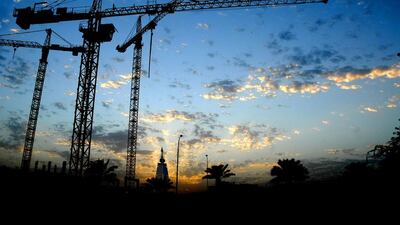Saudi Arabia is opening its stock market to direct investment by foreigners tomorrow. As the largest and most liquid market in the Mena region, there is understandably significant interest in and excitement about this event, and for economic reasons the decisions is also timely.
Saudi Arabia is the biggest economy in the GCC and the 19th-largest economy in the world, with a nominal GDP of US$753 billion last year. It is also the most populous nation in the GCC with 30.8 million people, most of them under the age of 30.
With the second-largest proven oil reserves in the world, Saudi Arabia's economic growth depends on oil. The country's hydrocarbons sector accounted for more than 40 per cent of GDP last year, up from 33 per cent of GDP in 2004.
Moreover, hydrocarbons account for about 90 per cent of its total budget revenue, and has thus been the main driver behind the substantial fiscal surpluses accumulated over the last decade.
The sharp decline in oil prices since last summer has had an immediate and significant impact on the country’s fiscal position. Last year’s budget included the first deficit in 12 years at 65.5 billion Saudi riyals (minus 2.3 per cent of the GDP), and the deficit is likely to have widened this year to about 12 per cent. In addition to further weakness in oil prices in the first quarter of this year, government spending has likely been higher than budgeted year-to-date as a result of one-off bonuses and disbursements on the accession of King Salman in February and the escalation of military activity in Yemen and against ISIL.
Given the increased spending on defence and the difficulty in reducing public-sector wages, Saudi Arabia is likely to cut its capital spending budget. However, the government has ring-fenced funding for major infrastructure projects.
The emphasis in recent years has been on developing transport, housing, education and healthcare infrastructure, including thousands of kilometres of roads, new schools, universities and hospitals, as well as expansion of ports, airports and railways. This year’s budget has allocated substantial funds for education, health care and social services infrastructure.
So far, the government appears to have been drawing down accumulated reserves to fund the shortfalls, with the Saudi Arabian Monetary Agency’s net foreign assets declining by $45.5bn in the year to April.
However, the stock of net foreign assets remains substantial at about $678bn, or 90 per cent of GDP, which provides a generous cushion against further oil price weakness and should let the government avoid an immediate, sharp fiscal consolidation.
It is in this context that the decision to open the Saudi equity market to direct foreign investment looks timely. Saudi Arabia has run a current-account surplus since at least 2006, mainly because of oil revenue. The current-account surplus narrowed to $75.6bn last year from $134.2bn the year before, both because of lower oil revenue and a higher deficit on the services balance, and looks like it will fall into deficit this year. An increase in portfolio investment after the opening of the equity market, while by no means necessary, would help to offset the decline in the current account, which in the absence of other inward investment would have put additional pressure on official foreign exchange reserves and reduced manoeuvrability on the balance sheet.
Although growth is expected to be slower this year, Saudi Arabia has strong fundamentals including low debt, substantial accumulated reserves and a young and growing population.
The Tadawul is the largest stock market in the Mena region and the seventh-largest in the global emerging market, with a market capitalisation of $570bn. It has an average daily traded value of about $2.5bn and it is the fourth-most liquid among its global emerging market peers.
However, the Tadawul has not been included in the MSCI Emerging Markets Index because of the restrictions on foreign ownership.
Opening the market to direct investment by foreigners removes the last hurdle towards being included in the MSCI index. According to market estimates, if included, Saudi Arabia could hold a weight of as much as 4.4 per cent in the MSCI Emerging Market index, which could translate into about $25bn of inflows and would be a welcome boost during uncertain times.
Tim Fox is the head of research and the chief economist at Emirates NBD.
Follow The National's Business section on Twitter


